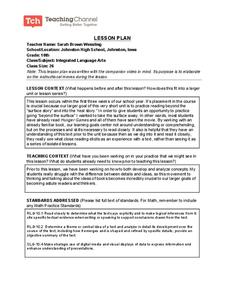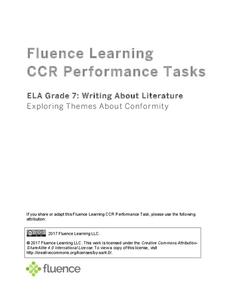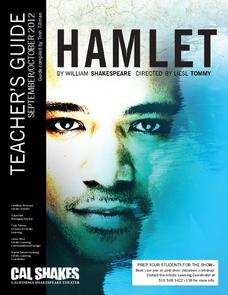Infobased Learning
Bloom's Literature: How to Write about Nineteen Eighty Four
A good prompt is hard to find, especially ones that encourage application, analysis, synthesis, and evaluation of a text. Help is here in the form of a prompt list for George Orwell's Nineteen Eighty Four that offers essay topics that...
iCivics
Lesson 3: Bias
How do journalists balance bias and ethical reporting? The final lesson in a series of five from iCivics examines the different types of bias and how they affect the news we read. Young reporters take to the Internet to find examples of...
McGraw Hill
Study Guide for Tuck Everlasting
Tuck Everlasting by Natalie Babbitt is a classic novel that readers have enjoyed for years. Resources within the study guide such as discussion and guided reading questions, extension activities, and graphic organizers aid comprehension...
McGraw Hill
Study Guide for Bridge to Terabithia
Bridge to Terabithia is a story about friendship that brings magic into ordinary life. Study guides may not be magical, but the guided questions, graphic organizers, extension activities, vocabulary, and discussion questions help...
ReadWriteThink
Analyzing Famous Speeches as Arguments
A speaker, a message, an audience. After analyzing these elements in Queen Elizabeth's speech to the troops at Tilbury, groups analyze how other speakers use an awareness of events, and their audience to craft their arguments....
Teaching Channel
Storyboard Lesson Plan
Good books are accessible through a variety of literary lenses. To consider how the same story can be seen in different lights, groups develop a storyboard for a movie teaser that would focus on one of six concepts found in Suzanne...
Prestwick House
Analyzing Multiple Interpretations of Literature
There is a reason why an Oscar is given each year for the Best Adaptation Screenplay. Adaptations are the focus of an exercise that asks class members to compare a work of literature with a least one adaptation of the work into a...
Prestwick House
Teaching Shakespeare: Sonnet 73
It's that time of year to consider how Shakespeare selects his images and structures his Sonnet 73 to develop the meaning of the poem. Class members examine the rhyme scheme, the indented lines, the conceit, and the images used in each...
Prestwick House
"Because I could not stop for Death" -- Visualizing Meaning and Tone
Emily Dickinson's "Because I could not stop for Death" provides high schoolers with an opportunity to practice their critical thinking skills. They examine the images, diction, rhythm, and rhyme scheme the poet uses and consider how...
Fluence Learning
Writing an Argument: Persuasive Speeches to Students
Powerful orators make their messages compelling with a combination of factors. Learn how to be an inspirational speaker with a reading assessment activity that presents a list of persuasive speaking techniques, as well as two speeches...
Fluence Learning
Writing About Literature: Exploring Themes About Conformity
Feeling the pressure to confirm is something any adolescent can relate to. Explore an essential theme with a response to literature assessment that prompts learners to identify main ideas with evidence and supporting details.
Fluence Learning
Writing About Literature: What Is Happiness?
Jack London's heart for adventure has come to define the spirit of America and its frontier. Selected passages from the foreword The Cruise of the Snark take eighth graders through London's construction and voyage of his ship before...
North Penn School District
The Catcher in the Rye
Learning more about Holden Caulfield's worldview and state of mind is an integral part of understanding J.D. Salinger's The Catcher in the Rye. A thorough packet of materials pertaining to the unit allow learners to build prior knowledge...
Curated OER
Fear, and Conquering Fear
The Lord of the Flies and The Kite Runner are the core texts in a unit that asks learners to examine various texts that show how fear can be a destructive force or it can be an agent of change. Individuals they design a project that...
California Education Partners
Glass Menagerie
As a reading comprehension assessment, ninth graders are asked to use evidence drawn from The Glass Menagerie to support an analysis of how Tennessee Williams uses specific lines to develop Amanda's character as well as her relationships...
Penguin Books
Teacher's Guide: Kindred by Octavia E. Butler
A teacher's guide for Kindred provides instructors with a wealth of materials to enrich either a full-class reading or independent study of Octavia E. Butler's popular science fiction novel. The activities are designed to encourage...
Preswick House
Teaching Unit: Invisible Man
Invisible Man is a core text in high school literature classes and one of the most cited works on the AP Literature and Composition exam. Instructors new to using Ralph Ellison's novel and those who have long included it as part of their...
Penguin Books
A Teacher's Guide to William Shakespeare's Hamlet
Should Hamlet avenge his father's death? Is the ghost telling the truth or is it trying to trick Hamlet? Is Hamlet's inconsistent behavior a ploy or is he really insane? Something really is rotten in Denmark, and with the help of the...
California Shakespeare Theater
Hamlet Teacher's Guide
Even those experienced teachers of Hamlet can find much to like in a guide that offers many fresh ideas for activities. Class members may take on the role of FBI profilers that investigate Claudius and Hamlet as murderers, or designers...
Alabama Learning Exchange
Edgar Allan Poe's Journey Through Life and Literature
How was Edgar Allan Poe able to create "intriguing, memorable, and lasting literature"? To answer this question, learners analyze the syntax, diction, and characterizations in Poe's poems and short stories and compare the impact of these...
Curated OER
The Use of Language in "I Know Why the Caged Bird Sings"
Readers of I Know Why the Caged Bird Sings are asked to craft an essay in which they compare how Maya Angelou uses figurative language to depict herself and Mrs. Flowers.
Star Wars in the Classroom
"Shakespeare and Star Wars": Lesson Plan Day 15
To conclude the study of the play, William Shakespeare's Star Wars: Verily, A New Hope, class members craft an in-class essay comparing Doescher's adaptation to George Lucas's film, Star Wars: A New Hope.
Star Wars in the Classroom
"Shakespeare and Star Wars": Lesson Plan Days 13 and 14
How important are sound effects in films? In stage plays? In radio programs? To gain an understanding of the impact of these special effects, class members watch a short video spoof of the sound in a scene from Star Wars: A New...
Star Wars in the Classroom
"Shakespeare and Star Wars": Lesson Plan Day 6
How can a screenplay create meaning and drama in ways that other forms of writing cannot? That is the question class members must answer as they compare the cantina scene of the screenplay for George Lucas's Star Wars: A New Hope with...

























